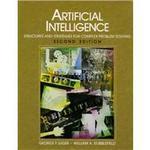
NEWS: Chatbots.org survey on 3000 US and UK consumers shows it is time for chatbot integration in customer service!read more..
Artificial Intelligence
Structures and Strategies for Complex Problem Solving

Artificial intelligence (AI) began as the quest to create machines that could think for themselves and (perhaps) out-think humans: the holy grail of computing! Over the years, while still exploring the mechanisms that enable thought, AI has evolved into a more pragmatic discipline. AI uses different strategies to solve the complex practical problems that present themselves wherever computing technology is applied. And intelligence itself is now known to be too complex to be described by any single theory - instead, a constellation of theories characterize the subject from different levels of abstraction. At the lowest levels, neural networks, genetic algorithms and other forms of computation aid understanding of adaptation, perception, embodiment, and interaction with the physical world. On a more abstract level, designers of expert systems, intelligent agents, stochastic models, and natural language understanding programs reflect the role of knowledge and social processes in creating, transmitting and sustaining knowledge. Further, logicians propose deduction, abduction, induction, truth-maintenance, and other models and modes for reasoning.
New Comment
Only registered members are allowed to comment. or login
or login
